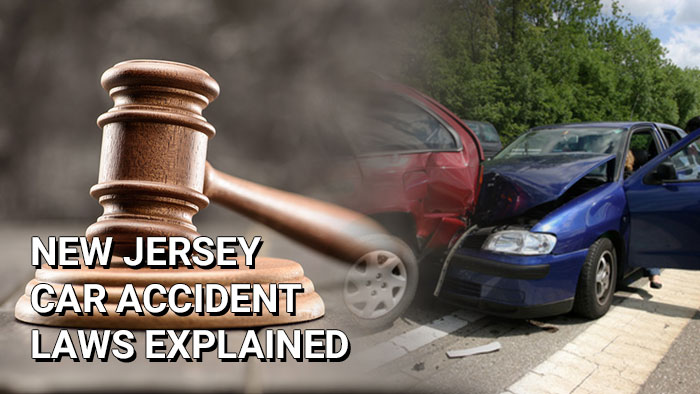
Do you know what to do if you get injured in an auto accident in New Jersey?
Laws about who pays for your medical expenses and when to consider a lawsuit are important and advantageous to all New Jersey drivers so that they can protect themselves and their loved ones.
Accident Reporting
New Jersey law requires motorists to report any vehicle accident that involves injury, death, or property damage exceeding $500. You may call 911 or your local police department.
After you report the accident, you will need to file a written report within 10 days, unless the police have already filed a report.
In completing your report, remember to stick with the facts and avoid giving opinions. Make sure to get a copy of the police report, as this may serve as a helpful piece of evidence in your injury claim.
No-Fault Insurance In New Jersey
NJ is a “no-fault” state, which means that regardless of who caused the car accident, your insurance carrier should cover your medical bills and other expenses up to your coverage limit. By contrast, in “fault” states, the at-fault party’s insurance would have to pay for the injured party’s damages.
NJ motorists are required to have personal injury protection (PIP) in their insurance policy. Your PIP is what covers you when you are injured in a crash. If your injury expenses exceed your PIP coverage, you can then file a claim against the at-fault driver.
PIP does not cover non-economic damages such as pain and suffering, disfigurement, and mental/emotional distress. To be compensated for these, you’ll have to pursue a claim against the at-fault party.
Minimum Car Insurance Requirements In NJ
New Jersey law allows drivers to choose between a Basic car insurance policy and a Standard car insurance policy. Each has its own minimums:
NJ Basic Policy Minimum Requirements:
- Personal injury protection – $15,000
- Property damage liability (for when you cause damage to someone else’s property) – $5,000.
NJ Standard Policy Minimum Requirements:
- Personal injury protection – $15,000
- Bodily injury liability (for when you cause someone else’s injury and they make a claim against you) – $15,000 per person; $30,000 total per accident
- Property damage liability – $5,000.
Comparative Negligence: If You Are Partly At Fault
“Comparative negligence” is the legal concept of assigning a certain share of fault to everyone who caused the accident. If you were found to be partly at fault, your compensation could be reduced accordingly. For example, if you were 10 percent responsible for the accident, your award could be reduced by 10 percent.
NJ follows the “modified comparative negligence” principle. It sets a threshold at 50 percent, which means that if you were more than 50 percent at fault – in other words, if your share of fault was bigger than the other driver’s – you would no longer receive compensation.
The comparative negligence rule is often used by insurance companies to minimize the amount they have to pay their claimants. You’ll want to have a lawyer on your side to protect you from being blamed for your injuries. Learn more about negligence and personal injury cases.
New Jersey Statute Of Limitations For Car Crashes
The statute of limitations is a law that sets a period of time within which you may file a lawsuit. In general, the statute of limitations for NJ car accident injuries is two years from the injury date. Missing this deadline means losing your right to sue.
It is wise to act quickly on your injury claim even if you are only dealing with insurance and not thinking about a lawsuit. Many auto insurance claims are delayed for long periods and end in failed negotiations. By the time claimants realize they need to sue to be properly compensated, their statute of limitations has run out.
You can avoid this mistake by consulting with an attorney as soon as you are able.
Full Tort Vs. Limited Tort
A key feature you should check in your auto insurance is whether it has a “Limitation on Lawsuit Threshold” or “No Threshold.”
A car insurance policy with no lawsuit threshold gives you full rights to sue the at-fault driver who caused your injuries. This type of policy is called “full tort.” On the other hand, a policy with a lawsuit threshold or limited tort policy restricts your right to sue. Filing a lawsuit is allowed only if your injury meets the legal threshold for “serious injury.” In NJ, very few injuries legally qualify as “serious,” such as loss of a limb, loss of a fetus, and disfigurement.
Having full tort insurance can be extremely useful if you wish to maximize the compensation you obtain from the at-fault motorist. But if your policy has a lawsuit limitation, talk to an attorney to see your other legal options to get compensated.
Contact a New Jersey Personal Injury Lawyer
If you are unsure about what to do after your car accident, or if you want to find your best legal options for compensation, don’t hesitate to reach out to a personal injury lawyer.
In New Jersey, we at The Grossman Law Firm are highly trusted for our effective legal guidance and representation in car accident injury cases. Your consultation with us is free. Call us at (732) 625-9494 today.
